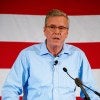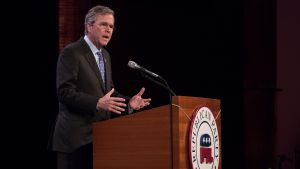Jeb Bush to Address The Chicago Council
About this event
Event Summary by Richard C. Longworth
Jeb Bush, sounding very much like a presidential candidate, gave the first foreign policy speech of his still-unannounced campaign to The Chicago Council on Global Affairs Wednesday. He used it to denounce the Obama Administration’s "inconsistent and indecisive" leadership, while calling for a new era of American engagement and leadership in the world.
In the most-noted passage, the former Florida governor said his foreign policy would not clone those of his father, George H.W. Bush, or his brother, George W. Bush.
"I love my father and my brother," he said. "I admire their service to the nation and the difficult decisions they had to make. But I am my own man and my views are shaped by my own thinking and own experiences."
Bush specifically distanced himself from his brother's much-criticized war on Iraq.
"Mistakes were made in Iraq for sure," he said. The United States relied on intelligence on weapons of mass destruction that was "not accurate." And failing to provide post-invasion security was "a mistake."
Bush spoke to a lunchtime audience of 750 people at Chicago's Fairmont Hotel. Much of his speech took aim at President Barack Obama, who also gave his first major foreign policy speech as a presidential candidate to a Council audience here eight years ago.
Interestingly, Bush's speech touched several of the themes that Obama struck then—the need for US global engagement, for restoration of American stature in the world, and for increased defense spending. In that speech, Obama criticized the "bluster and bombast" of the sitting president, whose brother returned the criticism here.
The "irony" of Obama, Bush said, is that "someone who came into office promising greater engagement has left America less influential in the world."
"With grandiosity, they announced resets and disengage," Bush said of the Obama administration. "Hashtag campaigns replace actual diplomacy and engagement."
"America does not have the luxury of withdrawing from the world," he said. “Our security, our prosperity and our values demand that we remain engaged and involved in often distant places. We have no reason to apologize for our leadership and our interest in serving the cause of global security, global peace, and human freedom."
But President Obama has provided "inconsistent and indecisive" leadership, he said. "We have lost the trust and confident of friends, while we no longer inspire fear in our enemies."
Bush divided his speech between broad principles that he said would guide his foreign policy and specific issues, such as Cuba, Iran, Israel, and ISIS.
The principles were:
- Economic growth at home, at least four percent per year. "We can’t be a force if our economy doesn’t grow over the long haul." He urged regulations and tax reforms and called for changes in entitlement programs to free money for infrastructure and other needs.
- "Our words and actions must match," he said. He criticized Obama for drawing "red lines," without backing his words up with action.
- Increased defense spending, to give America "the greatest military force in the world."
- Greater global engagement, including strengthening NATO and other alliances, and a strategy to defeat ISIS, which he called "violent extreme Islamic terrorism." This strategy, he said, should eschew diplomacy and aim instead "to take them out."
- The need to face "non-state threats," including radical Islamic terrorism. Better intelligence, including support for the National Security Agency, is vital, he said.
- "Liberty diplomacy," which he defined as a policy based on American values of individualism and liberty. "If we withdraw from the defense of liberty anywhere," he said, "the battle eventually comes to us."
Bush criticized the administration’s approach to nuclear negotiations with Iran, saying its "goal is not to solve the problem but to manage it." Congress needs to pre-emptively pass a bill reinstating sanctions if these negotiations fail, he said.
He coupled this with strong support for Israel and praise for the Congressional invitation to Israeli Premier Benjamin Netanyahu.
"I’m eager to hear what he has to say," he said. "It will be important for the American people to hear...I’m surprised that the administration is upset" by the invitation.
Bush criticized the negotiations that led to restoration of relations with Cuba. The result leaves the Castros in power, he said, while giving the United States nothing in return. He argued that more patience would have led to the collapse of Venezuela, Cuba’s last patron, which would have brought a more humble Cuba to the table.
Bush urged the West to give the Ukrainian government more armed support.
"To ignore a request for defensive support seems feckless," he said.
Two of Bush’s most emotional statements dealt with controversial domestic issues—immigration and economic inequality.
Multi-culturalism is one of America’s strengths, he said. "That is why immigration reform is so important."
And in response to a question from the audience, he said that "stickiness of poverty is a huge issue." By this, he said, he meant that "babies born in the wrong ZIP Code may never have a job."
"If you’re born poor in America today, you’re more likely to stay poor," he said. The same immobility applies to the rich.
"We are sticky at the ends, but the middle class is getting squeezed," he said.


